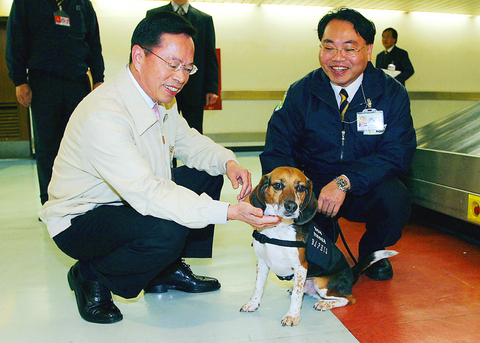The Council of Agriculture will adopt a carrot and stick approach in an effort to prevent pork from pigs that are sick or have died before reaching slaughterhouses from entering the market.
Lee Chin-lung (李金龍), chairman of the Cabinet-level council, made the remarks during a visit to Chiang Kai-shek International Airport yesterday to inspect the work of quarantine officers and sniffer dogs during the Lunar New Year holiday.

PHOTO: CNA
Amid public concern that a large amount of pork from pigs that were sick or had died before reaching abattoirs has been sold by unscrupulous money-hungry criminal farmers in local meat markets, the council is studying ways to manage the problem at the grassroots level, Lee said.
The measures being studied include educating pig raisers on how to handle dead pigs properly and providing incentives to persuade them to send sick or dead pigs to plants that produce organic fertilizer, Lee said.
The council also plans to launch a campaign warning pig farmers not to sell their dead or sick pigs to meat markets so as not to undermine the sale of pork in the hope that they will follow government policy.
In addition, the council is studying measures to confiscate the assets of those who make pork products from sick and dead pigs, Lee said.
Last Sunday, Premier Frank Hsieh (
Hsieh said the government would do whatsoever it can to punish those breaking the law.
"We want to seize their assets and make them so broke that they don't dare to do it again," he said.
Lee yesterday also took the opportunity to urge the public not to bring any fresh fruit or meat products into Taiwan, especially in light of the launch of cross-strait charter flights on Jan. 29 for the Lunar New Year holiday.
Noting that many Taiwanese are in the habit of bringing agricultural products into Taiwan from China, he said the council's Bureau of Animal and Plant Health Inspection and Quarantine has since Jan. 29 seized 640kg of smuggled agricultural and poultry products.

The Ministry of Economic Affairs has fined Taobao NT$1.2 million (US$36,900) for advertisements that exceeded its approved business scope and ordered the Chinese e-commerce platform to make corrections in the first half of this year or its license would be revoked. Lawmakers have called for stricter supervision of Chinese e-commerce platforms and more stringent measures to prevent China from laundering its goods through Taiwan as US President Donald Trump’s administration cracks down on origin laundering. The legislature’s Finance Committee yesterday met to discuss policies to prevent China from dumping goods in Taiwan, inviting government agencies to report on the matter. Democratic Progressive Party

Taiwan and its Pacific ally Tuvalu on Tuesday signed two accords aimed at facilitating bilateral cooperation on labor affairs, according to Taiwan’s Ministry of Foreign Affairs (MOFA). The governments inked two agreements in Taipei, witnessed by Foreign Minister Lin Chia-lung (林佳龍) and visiting Deputy Tuvaluan Prime Minister Panapasi Nelesone, MOFA said in a news release. According to MOFA, the agreements will facilitate cooperation on labor issues and allow the two sides to mutually recognize seafarers’ certificates and related training. Taiwan would also continue to collaborate with Tuvalu across various fields to promote economic prosperity as well as the well-being of their

Taiwan would welcome the return of Honduras as a diplomatic ally if its next president decides to make such a move, Minister of Foreign Affairs Lin Chia-lung (林佳龍) said yesterday. “Of course, we would welcome Honduras if they want to restore diplomatic ties with Taiwan after their elections,” Lin said at a meeting of the legislature’s Foreign Affairs and National Defense Committee, when asked to comment on statements made by two of the three Honduran presidential candidates during the presidential campaign in the Central American country. Taiwan is paying close attention to the region as a whole in the wake of a

NEW WORLD: Taiwan is pursuing innovative approaches to international relations through economics, trade and values-based diplomacy, the foreign minister said Taiwan would implement a “three-chain strategy” that promotes democratic values in response to US tariffs, Minister of Foreign Affairs Lin Chia-lung (林佳龍) said. Taiwan would aim to create a “global democratic value chain,” seek to capitalize on its position within the first island chain and promote a “non-red supply chain,” Lin was quoted as saying in the ministry’s written report to the Legislative Yuan submitted ahead of the legislature’s Foreign Affairs and National Defense Committee meeting slated for today. The Ministry would also uphold a spirit of mutual beneficial collaboration, maintaining close communication and consultations with Washington to show that Taiwan-US cooperation